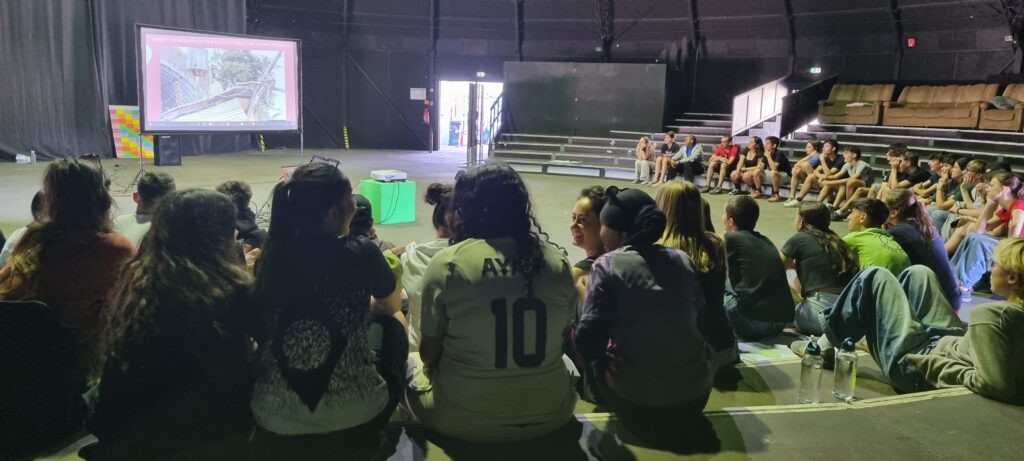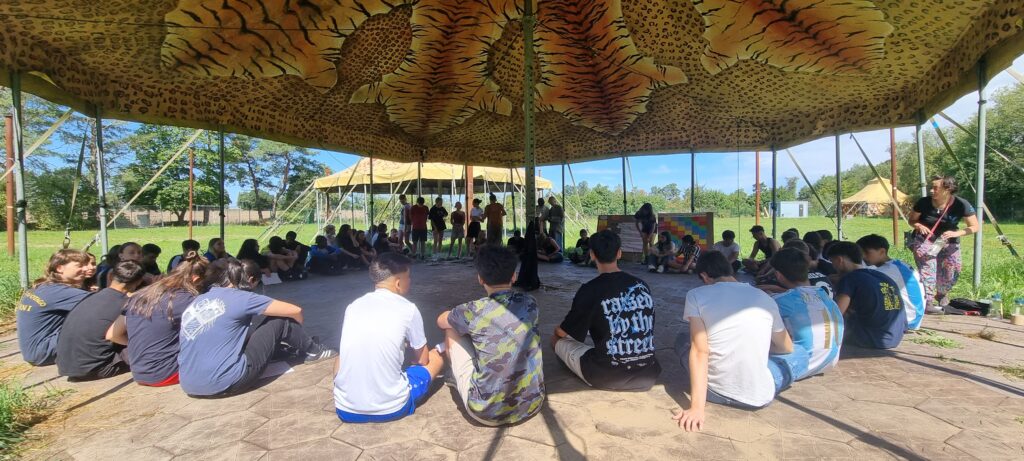
Group of young people currently living in Italy / Organization: Arciragazzi
The Italian group comprised of twelve youths from the province of Ravenna, who all worked together on the camp’s theme „Youth Culture and Democracy – Engine of Civil Society“.
The topic of youth cultures was firstly approached through music: the youths listened to and identified several songs that are particularly representative of different subcultures through the ages, with a particular focus on Italian society. They then split in pairs, each of which worked on one of the songs, analysing its meaning and significance in the context in which it was created. They presented their ideas to the rest of the group, and then all worked together on defining what youth cultures are or can be, and how they do or could manifest today. The group came to agree that, due at least in part to the pervasive, fast-paced and global nature of social media, it’s nearly impossible to identify clear cut cultural and social movements within their environment. None of them did find that they identified particularly with one subculture or another. They decided to try a different approach, discussing what experience both brings together and sets apart the youths of today: after debating for some time, they concluded that the Covid-19 pandemic and the restrictions to life as we knew it that came with it were the most defining and unifying event they had lived through, and that it profoundly shaped their growth as well as their perception and experience of the world.
The group then got to work on a presentation to communicate their viewpoint to their peers, which helped them to develop and expand their previous ideas, which they went on to work on further during the art workshops.
Voices of participants
Attending ArtCamp has been a deeply impactful experience, one that I was fortunate enough to enjoy for two consecutive years. Each time was unique, enriching, and offered me so much from every perspective.
In my first year, I arrived with no expectations. Even though I didn’t know what to expect, as soon as I got there, I found myself immersed in an extraordinary environment. For two weeks, I lived in a community free of prejudice and barriers, where communication went beyond words, surpassing even language differences. There was a mutual understanding that didn’t rely on one’s English level but rather on a desire to connect, a desire that, after the long period of isolation due to Covid, made everything even more special.
During my first ArtCamp, I formed deep and lasting relationships, so much that, six months after it ended, I traveled to Barcelona to visit two of my Catalan friends and celebrate my 18th birthday together. This shows just how important those relationships became in just two weeks.
When I returned to ArtCamp this year, I knew it wouldn’t be the same experience. The previous year had been unique, especially because it was the first one after Covid and it was all new for everyone. Despite that, the experience was still wonderful, even if in a different way. Finding myself in that context again, I saw in the faces of the first-time participants the same wonder and joy that I had felt the previous year, and this for me is what kept the magic of ArtCamp alive.
On top of all this, the organizers and team leaders are extraordinary people who offer constant and genuine support, ensuring that every participant feels welcomed and understood. This attention to everyone’s well-being helped make the experience positive, regardless of the differences from one year to another.
In the end, I can only recommend ArtCamp to anyone, regardless of their background, because it’s a place where differences disappears and a united group is formed. Of course, each year is different, and the experience might be more or less intense, but in my opinion, it’s always a worth living one.
Anna, italian participant of art camp 2023 and 2024
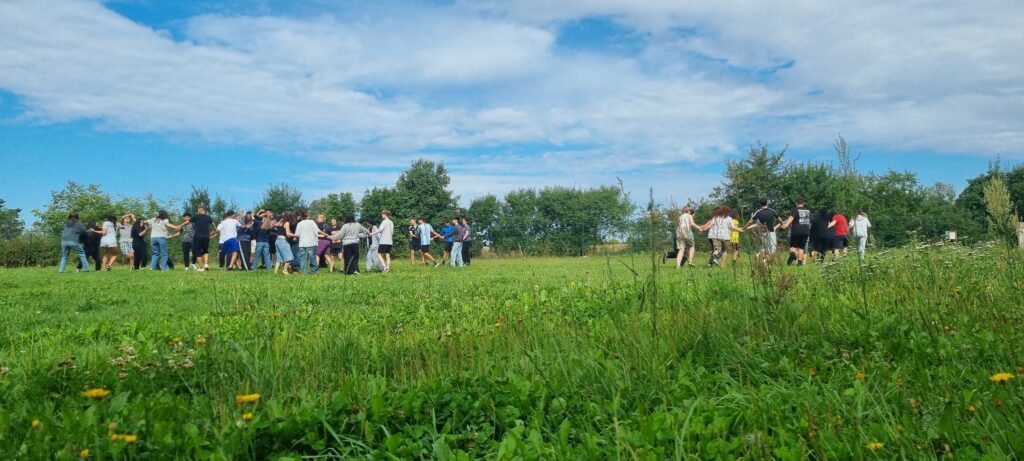
Group of young people currently living in Catalonia / Organization: Esplais Catalans
The Catalan group, is formed by a group of youths, from the village of Cardedeu and surroundings. Mostly from years ago they are part of the Esplai Bruixes I Bruixots dels Escorrelots. An organization dedicated to the political leisure education of children and youth. Directed by young volunteers in an assembly way.
Specifically with this youth group we work on young culture from an anti-adult-centric point of view. We let the youths tell each other their experiences and points of view about the treatment and discrimination they receive just because they are young in the social and political environments that shape our society.
We reflected on how our environment is decided and governed by adults who omit the opinion of young people. This gave rise to the debate on the importance of youth counter-culture. To create projects and movements created by and for young people, as non-adultcentric spaces. Analyzing the historical importance of young culture movements, especially those that revolved around musical identities. To reflect on how they should be in the present and in the future.
Finally by means of a theater the youths decided to express their feelings towards this adultcentrism that forces to create youth cultures, safe spaces in front of the social and political adult world.
“As exaggerated as it may sound, Art Camp has helped me to completely disconnect from the outside world and the most superfluous things in my normal day-to-day life.
I was able to live ten days cohabitating, doing activities and connecting with people from different cultural contexts in an artistically explosive space, very free and at the same time safe. I hope to be able to repeat similar experiences in the future.” (Kelly)
“For me the Art Camp has been an opportunity to explore in every way. with myself, with the ways of expressing myself, with opening the circle of friendships and relationships, getting to know different lifestyles, and enjoying time alone or accompanied.” (Martí)
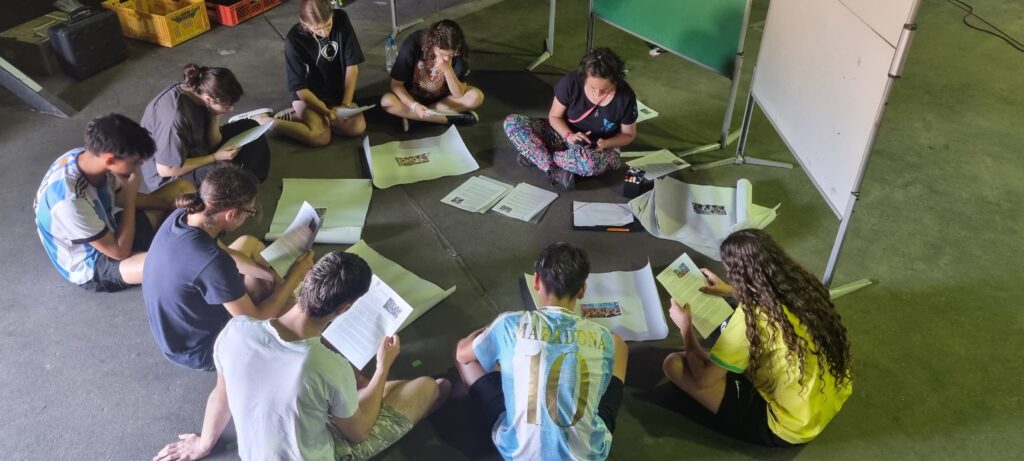
Group of young people currently living in Germany / Organization: Soziale Bildung e.V.
The group, whose members are based in Germany, primarily consisted of young people from Mecklenburg-Vorpommern. Additionally, young people from other parts of the Federal Republic were also part of the group.
As part of the theme „Youth Culture and Democracy – Engine of Civil Society,“ we worked intensively on youth cultures in a smaller group over three mornings.
The initial focus was on the question of what defines youth cultures. Together, the group gathered numerous aspects, organized, and discussed them. This exploration was complemented by a historical review, illustrated with the help of a timeline.
In the next step, the participants identified contemporary youth cultures that play a significant role today. In smaller groups of two to three people, individual youth cultures were examined in detail. The groups analyzed the values, role models, spaces, symbols, rituals, and activities that characterize each youth culture and assessed to what extent these align with democratic values.
This discussion served as a transition to an in-depth exploration of issues of discrimination within youth cultures. First, the participants developed a shared definition of discrimination. Based on this definition, the previously examined youth cultures were revisited, particularly concerning the question: „In what ways does discrimination occur within and through youth cultures?“ The discussion mainly focused on the youth cultures of football fans, punks, and hip-hop.
Subsequently, the group turned its attention to how discrimination within youth cultures can be counteracted. Discussions included the necessary measures to prevent discrimination and how individuals affected by discrimination can support one another.
The final part of the workshop was used by the participants to prepare a brief presentation to share their findings with the other groups.
This approach enabled the young people to engage in a nuanced exploration of the topics of youth cultures, democracy, and discrimination, while developing practical solutions. This provided a foundation for further work on the topic in the artistic workshops.
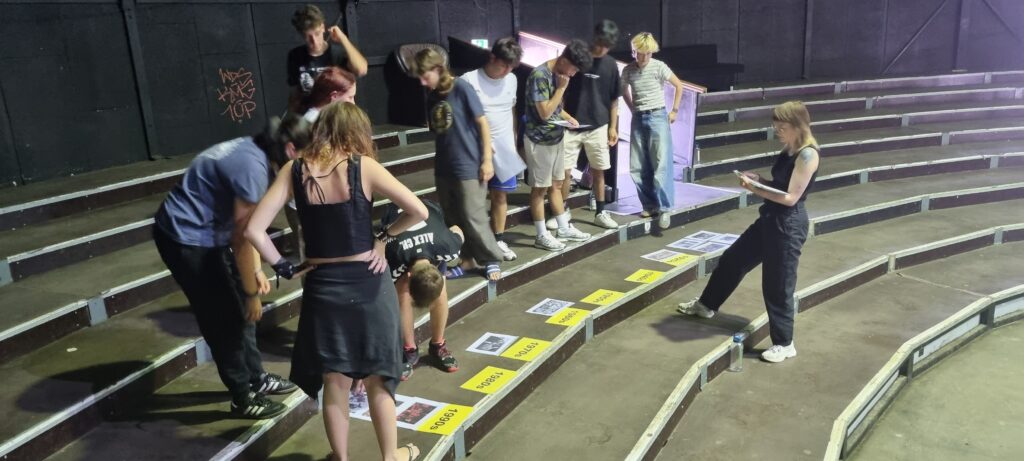
Group of young people currently living in France / Organization: CEMEA Pays de la Loire
The French group members were all based in the Loire-Atlantique Region in Western France. The majority live in the city of Nantes, but others came from nearby cities such as Saint-Nazaire, Saint-Sebastien-sur-Loire and Orvault.
During the first three mornings, the group worked together to find a common definition for this year’s theme: „Youth Culture and Democracy – Engine of Civil Society „
As some of the group members were meeting each other for the first time, we chose to spend the first morning getting to know each other and sharing what each member though defined youth culture, either in the present or in the past. Each participant was encouraged to talk about their background, personal interests, activities, role models and values. Different active education methods were used. The idea was to gather a pool of information regarding their, interests, activities, hobbies and eventually be able to see the world from their perspective.
During the second morning, the topics of political engagement and citizenship were introduced. Historical movements were discussed as well as symbolic works of art. Participants had the opportunity to draw or make a collage to share what engagement meant to them. Then, using cross interviews, we asked them to share two situations: one where they felt they were able to be active citizens in their society and another one where they might have felt powerless. These two activities were designed to help youth analyze their practices as well as those of their peers. Participants found that even though they came from different backgrounds, they had many political engagements in common: gender discrimination in sports, LGBTQ+ rights, immigration policies and discrimination, inequalities… And even though they couldn’t sometimes find the right words to express how they took an active part in their community, they were able to find common guidelines to define their current youth culture (s) and forms of engagement.
The last morning, the group did some brainstorming for the final presentation’s content. They collectively decided to make a video where each member could talk about either their political engagements, the ways they can engage in today’s society or what defines them as a youth group. Each member had the opportunity to write their text either in English or in French. The filming and editing took place and was conducted by themselves.
With this approach, our objective was to get youth to reflect on their own personal lives and to analyze their day-to-day practices. This lead to an increased awareness of the major role they play in today’s civil society. This work provided a foundation for further exploration of the topic during the artistic workshops.
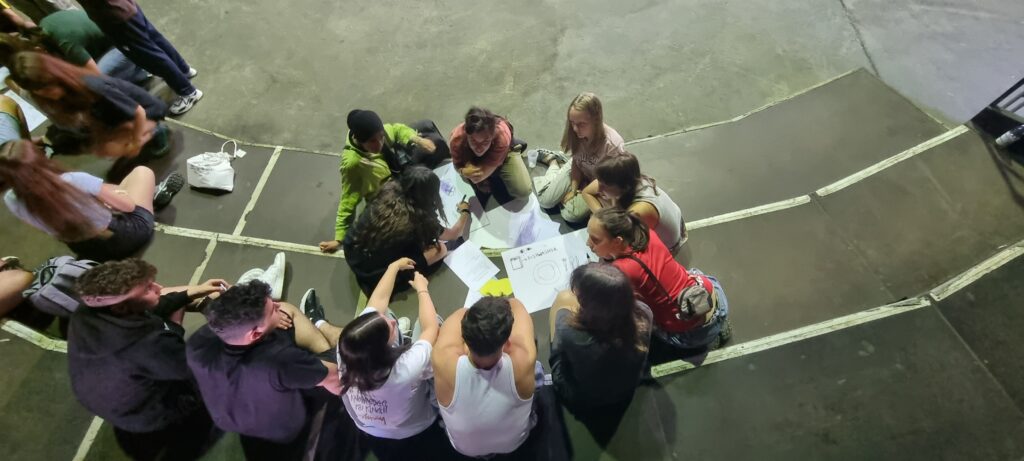
Group of young people currently living in Poland / Organization: Fundacja „Rodowo“
One part of the topic was youth culture so within the polish group we discussed their views of their own culture/subcultures and together we discovered how broad and colorful a spectrum of youth cultures today is, but also how their core values (like tolerance, kindness and empathy) brings them together, but also the music they listen to, not to say that all of them have identical taste, but there are songs that all of them enjoy and they enjoy it together. The other part of the topic was democracy and together they pulled their own feelings about it and have shown them with beautiful posters and a posed protest on scene.
In the spare time we were doing many fun activities like playing games or going to the lake, but also the youth was wandering around the place, discovering beautiful of art in the area, but mostly goofing around with each other.
The group also had much fun during the evening programme dancing and singing together with all their energy that’s left after creating wonderful pieces of art during the day.
But most importantly the kids were compassionate and kind towards each other, they shared joy together and created something that is a piece of everybody that was there.
Voices of participants
“After attending the Art Camp in Lärz last year I was very excited to go again this summer. I had high expectations after my previous experience and this years event did not dissapoint. From the creativity-inducing workshops during the day to the chill evening atmosphere – it was definitely the highlight of my holidays.
What I enjoyed most were the many opportunities I had to meet and talk with young people similar to me from different countries. During the workshops mentioned previously I was given the necessary environment to discuss important topics that are often overlooked in today’s society. Also, the whole time I was present among my peers I could learn fun and exciting things about their cultures and languages which helped expand my overall world view.
I can’t help but mention the delicious meals I had the privilege of eating during my stay at the Art Camp. Every day I was blown away by the inclusivity (providing vegan options) and amazing taste of the food, while it also being drawn from cuisines all over the world.
The atmosphere that’s created by the place we stayed at and the people that were there is truly unmatched and one of it’s kind. All of us have created so many beautiful memories together that I wish I could remember forever.” (Natalia )
“Art camp in Lärz in 2024 was incredible and definitely one of its own kind. I couldn’t be happier if I were to experience it again. The food was delicious and I wouldn’t be lying if I said some of the dishes were the best ones that I have ever eaten. Meeting new people and learning about their culture, every day workshops and even camp tasks- they were joyfull. One of the best things was how much free time we had. Those moments spent together with my friends will always remain in my memory.” (Natalia Bednarska)
“Art Camp is a great place to integrate with other people from other countries, as well as an opportunity to improve your talents thanks to the available work shops. The atmosphere of sleeping in tents and the charm of the whole place helped to break away from real life and get some rest. The team members were very friendly and helpful when needed. During the camp, I had the opportunity to take part in an artistic workshop and work on a joint project about various subcultures and political changes. It expanded my knowledge on the subject, and I also had the opportunity to develop my painting skills. I also met many people from abroad, which allowed for free integration during the camp. I would definitely recommend the entire experience to family and friends.” (Emilia Braun)
“My expirience on art camp was nothing short of a great time. The time was well managed by the teamers, so we always had something to do. I could also feel like i was contributing to the community by doing the daily camp tasks. Speaking of the community, the teamers put great effort to let all of the groups socialise and form really good and long lasting bonds. The plase we were spending the time in was also really interesting, and a great starting base to unleash our creativity in the workshops. I felt like i could just be myself and be supported from all the sides. I certainly want to go back there in the future.” (Wiktor Morkis)
